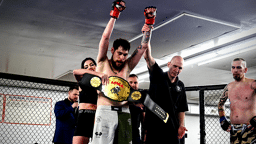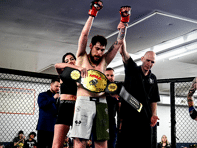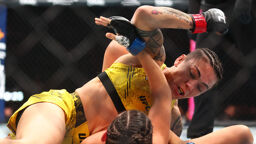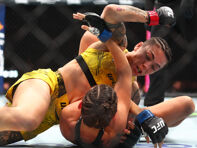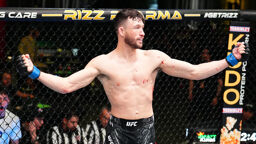I waited until 3 a.m. in Connecticut, midnight in Los Angeles, before I even began writing this first post for 2021.
Not until I was sure 2020 had left the continental United States did I even type the first word of this, for fear somehow elements from the horrible, horrible year would follow me into the bright promise of this new year.
But the truth is, 2021 is not a clean slate, and never was going to be. Covid-19 rages on worse than ever, our politics and our people are more divided than ever, and 2020 ended with more Black and Latinx transgender women murdered than in any other year: at least 43 victims of hate and transphobia.
Those are hardly the only outstanding issues from the past that we face this new year: Where are the out gay men now playing in the NFL and NBA? When will closeted gay and bisexual men in the MLB play ball? Will there be male NHL players who not only use Pride tape on the ice but come out to their teams and their fans?
Could we get just one?
We’re grateful, of course, for the out LGBTQ players, coaches and support personnel in the WNBA, NWSL, USWNT, the USL Championship, NWHL, AEW, UFC, the Olympics and sports leagues around the world who prove everyday that Courage Is Contagious. That’s you: our readers, athletes, team leaders and fans.
And I start there, with a new message for a new year.
This is for you
The old year started with my letter to TERFs. This time, I’m writing to reach just one person, and it might be you, out there somewhere, in a hotel room, on holiday at a vacation spot, or maybe at home, or in a locker room. Feeling like you’re all alone, keeping a secret, perhaps even from those closest to you. Looking at a phone or a tablet, surfing outsports.com.

Like you, they’re reading the coming out stories of college hockey player Brock Weston, SMU forward Bri Tollie, slugger Brett Lysohir, linebacker Jack Storrs, soccer player Henry Bethel, ski champion Hig Roberts, gymnast Paul Ruggeri, tennis player Jeremy Sonkin, paralympian Ness Murby and bowler Christine Rebstock. I imagine they see themselves in these stories, up to a point… and that’s the problem I want to address.
They don’t believe “It Gets Better.” They buy into propaganda that coming out as a male pro athlete will end their dreams. They fear that teammates who banter now might avoid them or worse, consider them cursed. Coming out might deprive them of playing time because homophobic managers, coaches and/or owners will sideline them. They dread being abandoned by sponsors, ridiculed by fans and worry they may bring shame to their families or be scorned by their religious flock.
Most of all, these men despair at the thought that their days as a pro athlete might end: to never play again, score, succeed, win, and most of all, feel the pride that only an athlete knows in pushing their body to its absolute limit of accomplishment and physical prowess. They’d be done.
Don’t believe the hype
Every reader of Outsports knows that is not how these stories typically end. Oh, yes, there was a time, and not so long ago, and there are still some very notable exceptions. That is why these examples all seem so certain, so real. There are even those who perpetuate the fear of these potential outcomes, counseling closeted athletes to stay where they are.
“Look at what became of Michael Sam,” some say. Others ask why Ryan Russell is still a free agent without a team since coming out as bisexual. Must the answers be, “Because they came out?” Not necessarily. Others ask, “Remember what happened to Glenn Burke?”

We do. MLB’s Billy Bean certainly does. This past summer, as we marked 25 years since Burke’s passing, and the hardships he endured because he was gay. Bean wrote him a public letter in Outsports about how much has changed in baseball, in large part, because of what they each experienced.
“We lived the same isolation and fears while playing a sport we love,” Bean wrote, “and doing so during a time that was much different and less accepting.”
Hey: I’m not going to bullshit this reader, who worries so much about what coming out could cost. There is indeed a risk; for trans people, we know taking that step out of the closet could very well mean losing everything. And I do mean “everything.” Some of us caution others not to come out until it is impossible to bear living in that closet even one more day. And as someone whose coming out was a trainwreck, that’s good advice. Staying hidden may be necessary, even for this reader I’m hoping to reach.
After all, sports, and the rest of our world, is not perfect, in 2021 or at any time now or in the future. But it is no longer the dark ages. There will no doubt be a hub bub, a media feeding frenzy, and some fans will boo. The truth is, that will happen whether someone comes out, or not. “Boos,” of course, mean the fans know your name, and there’s value in that, too, especially for wrestlers.
Free to be

In the end, an athlete who comes out gets something else: As Marlo Thomas sang generations ago, they’re free to be you and me, a genuine sense of freedom from burdens. They will play without expending any energy hiding or holding back their authentic selves. Ask any out athlete, or anyone who’s come out for that matter, how much it took, day after day, to hide their true selves, to have to wear a mask of sorts, one that’s in addition to the ones we wear for protection from the pandemic.
I am constantly asked by straight people, what’s the big deal about “coming out”? Why does it matter in sports who’s gay or lesbian or bi or trans? “Just shut up and dribble,” said one ignorant bitch on TV, talking about race, an entirely different category of “identity politics.”
The reason we celebrate our identities is because they are a part of us. No it’s not the same as when Black athletes last summer called out oppression based on the color of their skin, but it is related in another way: a way that is represented by our ongoing struggle to love who we love, to live how we know ourselves to be; To not get married on Sunday and fired on Monday; To not be harassed, beaten or murdered because of who we are or who we’re attracted to; To find a job, a home, or obtain proper legal identification in our chosen name; To not be erased because others judge us for our differences.
Imagine how different 2021 will be when a major pro athlete steps up and says: “This is who I am. Deal with it.” The time is right, my reader. Like those before you, you will find it far less arduous than you feared. And then we’ll talk, and you’ll say: “I regret that I waited so long!”
And that’s okay. I did. And I will regret that you did, too. We all will.
Wouldn’t being out be a great way to spend 2021?
Follow Dawn Ennis (@lifeafterdawn) on Twitter, Facebook, Instagram, YouTube, SnapChat and now even TikTok, if you can believe it.
If you are an out LGBTQ person in sports and want to tell your story, email Jim ([email protected])
Check out our archive of coming out stories.
If you’re an LGBTQ person in sports looking to connect with others in the community, head over to GO! Space to meet and interact with other LGBTQ athletes, or to Equality Coaching Alliance to find other coaches, administrators and other non-athletes in sports.









